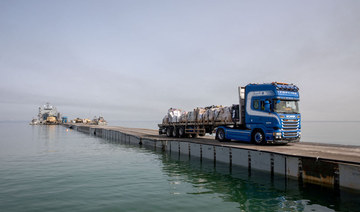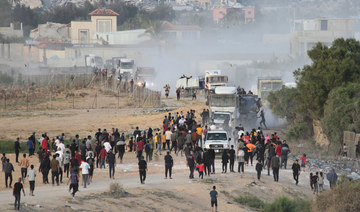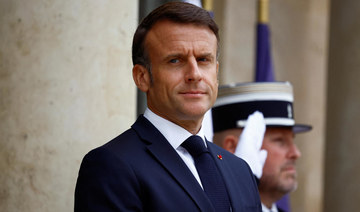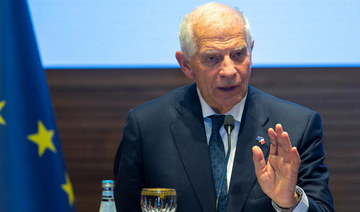BEIRUT: Lebanon’s new proportional representation electoral system has created a long-awaited opportunity for opponents of Prime Minister Saad Hariri. It gives them a chance to confront him and reject what they consider “the Future Movement’s monopoly over Sunni representation.”
The most prominent clash will be in the Beirut II constituency, where nine electoral lists are competing — the largest number in the country.
The confrontation is a political one, reflected in the campaign speeches of Hariri and his Hezbollah opponents. These did not focus on who will win, but on who will have a majority of seats and influence domestic political decisions as well as Lebanon’s status in the region. They also ruled out any political alliance between the two sides — but they will be forced into “political cohabitation” in the cabinet.
 Hezbollah Deputy Secretary-General Naim Qassem spoke about the identities of those who he thinks will head the parliament and the government. He has decided that Nabih Berri will return as speaker, and declared that “it isn’t necessary for the head of the government to have a large parliamentary bloc or even be a member of parliament.”
Hezbollah Deputy Secretary-General Naim Qassem spoke about the identities of those who he thinks will head the parliament and the government. He has decided that Nabih Berri will return as speaker, and declared that “it isn’t necessary for the head of the government to have a large parliamentary bloc or even be a member of parliament.”
His speech suggested that Hezbollah would enter the new era with strong influence regardless of the results at the ballot box.
It seems Hezbollah is also hinting at amending the agreement that made Free Patriotic Movement (FPM) founder Michel Aoun president in exchange for installing Hariri as prime minister. One of Hezbollah’s main conditions is that the new government’s ministerial agenda does not include anything that could affect the role and fate of the resistance.
Former MP Mustafa Alloush, a member of the Future Movement’s political office, said Hezbollah is seizing every opportunity to prevent Hariri’s return to the premiership.
“I believe the presidential settlement will continue if Hariri wins an influential parliamentary bloc in alliance with FPM,” he said. “Hezbollah may seek to unite with all other blocs to face the Future Movement — consensus here becomes an expression of the balance of power.
“The balance may be negative and capable of destroying everything, or it could be positive through which the government can be run and arms control can be imposed, but this cannot change unless the region’s situation is changed.”
In contrast, Hariri’s speech focused on “Lebanon first,” the country’s Arab identity, and the necessity of “an influential bloc in the parliament to be able to hold dialogue with all political parties.”
“Hezbollah cannot cancel me and I cannot cancel Hezbollah,” said Hariri. “I cannot accept their regional strategy nor can they accept mine, but why should the people of Lebanon pay the price? From here rises the importance of the consensus that is being developed under the auspices of the Lebanese president.”
Alloush described Hariri’s words as “a historic speech for ensuring political and security stability, to ensure economic stability and employment opportunities.”
Hezbollah chief Hassan Nasrallah’s speeches suggest the party is worried about a decline in support and public objections to its performance, in terms of losses in Syria and lack of attention to domestic development.
 Hezbollah has altered its campaign rhetoric from a focus on the military to providing health and old-age benefits, improving education, supporting the Lebanese University, and improving economic and financial policies, among other promises.
Hezbollah has altered its campaign rhetoric from a focus on the military to providing health and old-age benefits, improving education, supporting the Lebanese University, and improving economic and financial policies, among other promises.
“For the first time, the leader of the Hezbollah militia is trying to make his political rhetoric different than before,” Alloush said. “Nasrallah is forced to discuss developmental issues and corruption because the resistance’s logic and arms can no longer be the sole focus during this stage, because Hezbollah’s community is now criticizing the party’s performance in developmental areas, and Hezbollah has not offered any economic or developmental vision for Lebanon or the areas it influences.”
Political analyst Hussam Itani believes “the political settlement will continue in Lebanon.”
He said: “I don’t believe Hezbollah would want to start an internal political conflict in Lebanon with the Sunni community in light of the current tension between Iran and Israel.”
Lebanese election fuels confrontation between bitter political rivals
Lebanese election fuels confrontation between bitter political rivals

- The most prominent confrontation will be in the Beirut II constituency, where nine electoral lists are competing.
- Hezbollah has altered its campaign rhetoric from a focus on the military to providing health and old-age benefits, improving education, supporting the Lebanese University, and improving economic and financial policies.
Palestinian refugees’ health suffering crushing blow due to Israeli war in Gaza: UNRWA

- Destruction of infrastructure, transportation has affected healthcare delivery
LONDON: Palestinian refugees in Gaza are experiencing an unprecedented health crisis as a result of Israel’s war on the region, according to the annual UN Relief and Work Agency’s health report released on Tuesday.
Palestinian refugees’ health and well-being have suffered a “crushing blow,” the report said, with higher rates of injury, trauma, and mental health disorders.
The destruction of infrastructure and transportation has affected healthcare delivery, while congested living conditions and limited access to clean water have increased the risk of infectious disease.
Hepatitis and types of diarrhea are becoming more common. Malnutrition has also hit the region, with one out of every three children under the age of 2 in the northern Gaza Strip experiencing acute malnutrition.
Healthcare access declined in the fourth quarter of 2023 as 14 out of 22 health centers were forced to close, and power outages crippled telehealth systems.
UNRWA established 155 emergency shelters in response, deployed 108 mobile medical units, coordinated the shipment of critical medicines, and implemented disease outbreak surveillance.
Dr. Akihiro Seita, UNRWA’s director of health, said: “The health crisis among Palestine refugees can only be mitigated with immediate and sustained healthcare interventions and support.
“UNRWA remains committed to addressing these urgent needs and improving the health and well-being of Palestine refugees.
“Our staff (have) remained at the frontline in Gaza. As of May 2024, UNRWA has lost over 191 staff members, including 11 healthcare professionals. Our hearts go out to the affected families.
“This report underscores our gratitude for the dedication of our healthcare staff, who continue to deliver quality services despite their loss and being displaced several times.”
Increased restrictions of movement and rising violence have also created new challenges in the West Bank. UNRWA has adapted by finding temporary solutions to ensure patient access and uninterrupted delivery of medical supplies.
More than 2 million patients rely on UNRWA’s health services in Jordan, Lebanon, the West Bank (including East Jerusalem), Gaza, and Syria.
Despite operational challenges, including defunding, UNRWA managed to provide nearly 7 million primary healthcare consultations in 2023, maintaining high levels of immunization, particularly in Gaza, which has played a critical role in preventing outbreaks of vaccine-preventable diseases.
US-built pier in Gaza will need to be removed and repaired after damage from rough seas

- The pier is one of the few ways that food, water and other supplies are getting to Palestinians
WASHINGTON: The Pentagon says the US-built temporary pier taking humanitarian aid to starving Palestinians has been damaged in rough seas and weather and will be removed from the coast of Gaza to be repaired.
Pentagon spokeswoman Sabrina Singh told reporters Tuesday that over the next two days the pier will be pulled out and sent to the southern Israeli city of Ashdod, where US Central Command will repair it.
She says the fixes will take “at least over a week” and then the pier will need to be anchored back into the beach in Gaza.
The pier is one of the few ways that food, water and other supplies are getting to Palestinians who the UN says are on the brink of famine amid the nearly eight-month-old Israel-Hamas war in Gaza.
Arab League chief urges wider recognition of Palestinian state

- Ahmed Aboul Gheit issued the warning while taking part in a series of Arab League meetings with European foreign ministers
- The meetings in Brussels on Sunday and Monday discussed practical political solutions to end the fighting
CAIRO: The Arab League secretary-general said in Brussels that Israel’s aggression in the Gaza Strip could undermine any chance for peace and extinguish hopes of achieving a two-state solution, posing significant risks not only for the Middle East but also for international security.
Ahmed Aboul Gheit issued the warning while taking part in a series of Arab League meetings with European foreign ministers and other officials on the Palestinian-Israeli situation in light of the conflict in Gaza.
Hossam Zaki, Abdul Gheit’s assistant, said that the meetings in Brussels on Sunday and Monday discussed practical political solutions to end the fighting and subsequent steps to ensure peace.
During his discussions with European ministers, Aboul Gheit highlighted the need for more European countries to recognize an independent Palestinian state based on the June 4, 1967, borders, with East Jerusalem as its capital.
This would signal to Palestinian people that their right to independence is respected by Western countries, along with other nations in the world, he said.
Aboul-Gheit thanked the foreign ministers of Ireland, Norway, and Spain for their decision to recognize an independent Palestinian state.
Zaki said that the discussions revealed an increasing inclination toward addressing the situation collectively by convening an international conference to implement the two-state solution.
This approach is seen as the only way to save the region from prolonged and continuous violent conflict, he said.
Aboul Gheit, along with the foreign ministers of Saudi Arabia, Egypt, Jordan, Qatar, and Bahrain, urged European countries to move beyond merely discussing the feasibility of the two-state solution.
They advocated for clear and concrete steps to implement it on the ground, addressing the root causes of the conflict, Zaki said.
El-Sisi in Beijing to attend China-Arab cooperation forum

- The visit coincides with the 10th anniversary of relations between Egypt and China
- El-Sisi is also scheduled to meet the heads of several major Chinese companies
CAIRO: Egypt’s President Abdel Fattah El-Sisi arrived in Beijing on Tuesday on a state visit to China and to attend the China-Arab States Cooperation Forum after an invitation from President Xi Jinping.
El-Sisi will hold talks with Xi and senior Chinese officials focusing on ways to forge closer relations and unlock broader prospects for cooperation in several fields.
The visit coincides with the 10th anniversary of relations between Egypt and China being raised to the level of a comprehensive strategic partnership.
Ahmed Fahmy, spokesman for Egypt’s presidency, said the talks will also focus on regional and international issues of common interest, primarily the war in Gaza and ways to restore stability in the region and achieve the aspirations of its peoples for peace, security, and development.
El-Sisi is also scheduled to meet the heads of several major Chinese companies.
The meetings are expected to explore opportunities to attract more investment to Egypt in light of the state’s orientation toward enhancing mechanisms for the localization of industry and technology transfer.
Egypt is eager to collaborate closely with the private sector and encourage foreign direct investment.
El-Sisi will attend a meeting of the China-Arab States Cooperation Forum, to be held on May 30, with the participation of the Chinese president and a number of Arab leaders.
The forum will discuss various aspects of China-Arab relations and ways to further advance them.
Egypt’s government said the forum is a framework for dialogue and cooperation between Arab states and China. Its founding document was signed in September 2004 at the headquarters of the Arab League in Cairo following a visit by the Chinese president.
Mossad chief staged decade-long influence, intimidation campaign against ICC prosecutor

- Yossi Cohen sought to steer court away from investigating Israeli crimes in Occupied Territories
- ‘Despicable tactics’ used including ‘keen interest’ in prosecutor’s family, source tells The Guardian
LONDON: A former chief of Israel’s Mossad intelligence agency staged a years-long campaign of intimidation against a former International Criminal Court prosecutor in an attempt to sway war crimes investigations, The Guardian reported on Tuesday.
Fatou Bensouda, the former ICC prosecutor, became a target of Yossi Cohen in the years leading up to her opening a formal investigation into alleged war crimes in the Occupied Territories.
Launched in 2021, the investigation ended with the seeking of an arrest warrant for Israeli Prime Minister Benjamin Netanyahu by Bensouda’s successor Karim Khan.
Israel has long feared the results of the investigation, including the threat of prosecution against its military personnel, which was used as justification for Cohen’s decade-long campaign to undermine the court.
As Mossad director, Cohen, a close ally of Netanyahu at the time, was acting as the prime minister’s “unofficial messenger,” a source told The Guardian.
In total, four sources told the newspaper that Bensouda had briefed top ICC officials about Cohen’s campaign, which one official described as “stalking” and involving intimidation.
On several occasions, Cohen had “put pressure” on Bensouda to avoid opening the Palestine case at the ICC.
“You should help us and let us take care of you. You don’t want to be getting into things that could compromise your security or that of your family,” Cohen told her, according to the account of one ICC official to The Guardian.
As part of the targeted campaign against Bensouda, Cohen used “despicable tactics,” including taking a “keen interest” in her family, one source said.
Mossad obtained secret recording transcripts as well as photographs of Bensouda’s husband, which Cohen personally showed her.
His campaign was helped by the former president of the Democratic Republic of Congo, Joseph Kabila, in an unlikely alliance that proved crucial to Cohen.
It is unclear why Kabila aided him, but his status as the leader of a country facing ICC investigation helped him set up a “chance” meeting between Bensouda and Cohen.
The ICC prosecutor and Cohen appear to have first met at the Munich Security Conference in 2017, two years after Bensouda opened a preliminary investigation into the Palestinian file.
A year later, Cohen “ambushed” her in a New York City hotel as she was due to meet Kabila to discuss the situation in his country, The Guardian reported. Cohen’s “surprise” appearance was said to have “alarmed” ICC officials at the time.
He had earlier made a series of trips to the DRC, relating to what was described by Israeli broadcaster Kan as an “extremely controversial plan.”
Following the New York meeting, Cohen repeatedly phoned Bensouda to request further talks in an attempt to “build a relationship” and “play good cop,” sources told The Guardian.
But the influence campaign failed when in 2019, Bensouda announced that she had grounds to open a full criminal investigation into war crimes allegations in the Occupied Territories.
She first requested a ruling from the pre-trial chamber of the ICC, confirming the court’s jurisdiction over Palestine.
At this stage, Cohen stepped up his campaign against Bensouda into “threats and manipulation,” fearing the results of an official investigation being launched.
Senior ICC officials had suspicions that Israel had cultivated sources within the court’s office of the prosecutor.
In 2021, the ICC’s pre-trial chamber confirmed that the court had jurisdiction over the Occupied Territories. A month later, Bensouda formally launched the criminal investigation.
She said at the time: “In the end, our central concern must be for the victims of crimes, both Palestinian and Israeli, arising from the long cycle of violence and insecurity that has caused deep suffering and despair on all sides.”
Her successor, Khan, has vowed to prosecute “attempts to impede, intimidate or improperly influence” ICC officials after a warrant for Netanyahu’s arrest was sought.
The recent results of the investigation first launched by Bensouda represent a heavy blow to Israel’s international standing, and mark a failure of Cohen’s decade-long campaign to influence the court.
“The fact they chose the head of Mossad to be the prime minister’s unofficial messenger to (Bensouda) was to intimidate, by definition,” one source told The Guardian.
In response to questioning by the newspaper, a spokesperson for the Israeli prime minister’s office said: “The questions forwarded to us are replete with many false and unfounded allegations meant to hurt the state of Israel.”
Khan’s move last week to seek arrest warrants against Netanyahu marked the first time the ICC has taken action against leaders of a country closely allied with the US and Europe.
Netanyahu’s alleged crimes pertain to the war in Gaza, and include directing attacks on civilians and using starvation as a method of warfare.





















